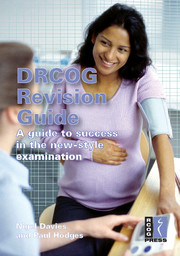Book contents
- Frontmatter
- Contents
- Foreword
- About the authors
- Acknowledgements
- Abbreviations
- 1 Introduction
- 2 The curriculum
- 3 Syllabus
- 4 The new DRCOG examination
- 5 Extended matching questions
- 6 EMQ paper one
- 7 EMQ paper two
- 8 Single best answer (best of five) questions
- 9 Single best answer paper one
- 10 Single best answer paper two
- 11 Multiple choice questions
- 12 MCQ paper one
- 13 MCQ paper two
- 14 Ten tips for candidates
- 15 Answers
- Mock examinations answer sheets (blank)
- Index
Foreword
Published online by Cambridge University Press: 05 August 2014
- Frontmatter
- Contents
- Foreword
- About the authors
- Acknowledgements
- Abbreviations
- 1 Introduction
- 2 The curriculum
- 3 Syllabus
- 4 The new DRCOG examination
- 5 Extended matching questions
- 6 EMQ paper one
- 7 EMQ paper two
- 8 Single best answer (best of five) questions
- 9 Single best answer paper one
- 10 Single best answer paper two
- 11 Multiple choice questions
- 12 MCQ paper one
- 13 MCQ paper two
- 14 Ten tips for candidates
- 15 Answers
- Mock examinations answer sheets (blank)
- Index
Summary
Modern professional practice, be it in medicine, law, education or accountancy requires evidence of attainment of competence. We need to demonstrate to our patients, customers, clients and colleagues that we are who we say we are and that we are capable of delivering a high-quality service in our chosen field. Paper qualifications have never carried more weight, nor been regarded more highly than in the cynical world of the 21st century. The corollary to this statement is that the qualifications themselves must only be awarded after a comprehensive and rigorous assessment of the knowledge of the candidate. This pressure for validation of quality has driven the RCOG to perform radical surgery on its examinations, both for the Membership and the Diploma of this College. Much has been learned from educational theory and from the format and structure of other examinations both within and outside the world of medicine. Some of the changes have been driven by wider manipulations of the structure of medical training in UK, for example the move away from 6-month attachments in obstetrics and gynaecology at senior house officer level for the majority of aspiring GPs. However, there is a higher motivation to the process of change within the RCOG's examinations, namely to make our processes more fair, more transparent and more ‘fit for purpose’ for the next decade. The role of the GP in women's health has moved a long distance from the provision of home delivery towards a more team-based and holistic model of care.
- Type
- Chapter
- Information
- DRCOG Revision GuideA Guide to Success in the New-Style Examination, pp. vii - viiiPublisher: Cambridge University PressPrint publication year: 2008



